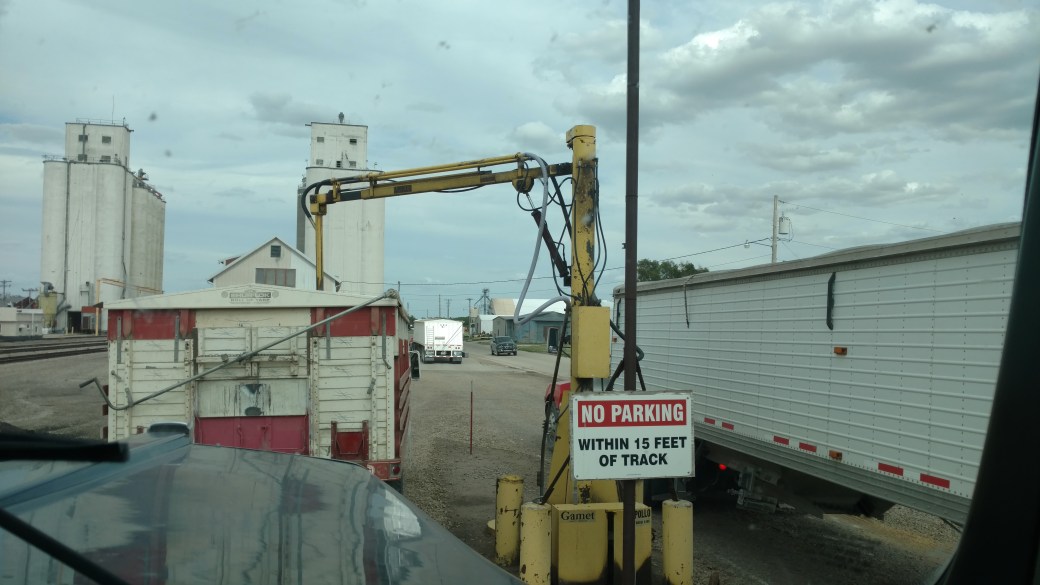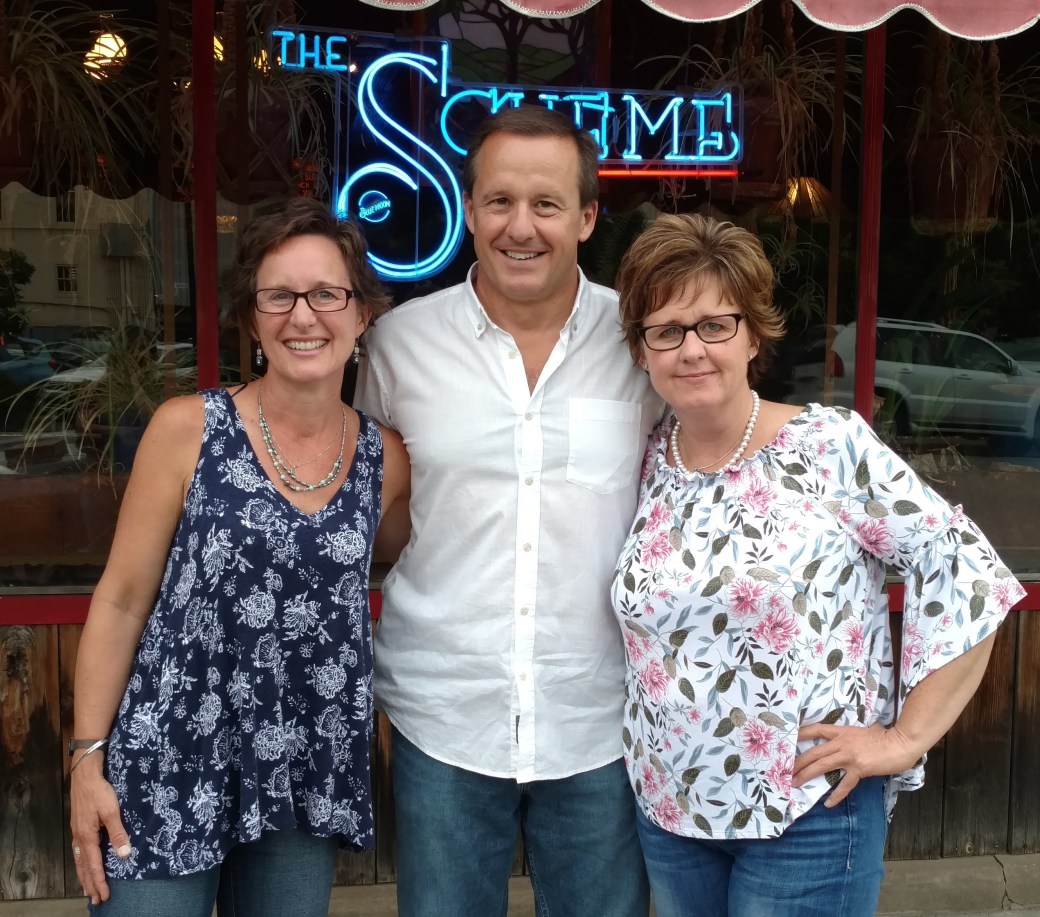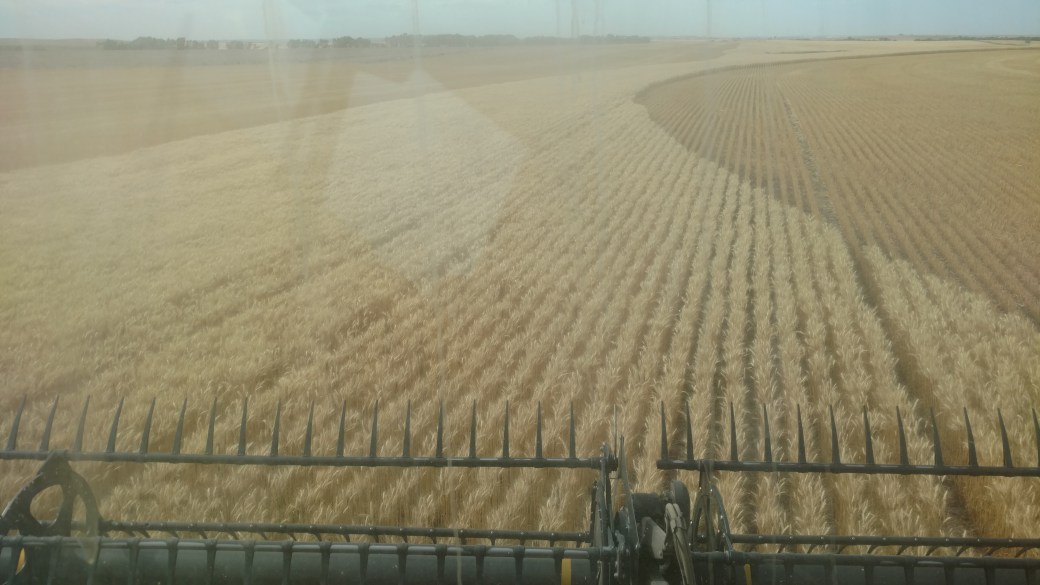
![24129630_1925515547463360_6799156173651245620_n[1]](https://thesisterlode.com/wp-content/uploads/2017/11/24129630_1925515547463360_6799156173651245620_n1.jpg?w=1040)
AFTER HARVEST
Night and Day. Black and White. All or nothing. Abundance and Lack.
Sometimes it is one extreme, often it is somewhere in between. As an adolescent in the late 70’s/early 80’s, I was sensitive—overly sensitive, as I see now—to the whole abundance and lack thing. In my young mind, it was simply one or the other. Plenty or scarcity. Usually never just enough-which is what we always had.
Looking back now, I see that it was always enough, and, seeing it with my adult eyes, I view it now as plenty. But I didn’t see it then.
Like so many things in life, it is rarely black or white. It is usually an undetermined shade of gray.
***********
I went to the farm last weekend to partake of the annual wheat harvest on my family farm. My two farming brothers had just got harvest into full swing, and I was able make the trip on the day they began. Gail and Suzanne were not able to join me, so I went solo. I would have preferred to have their company, but this did not deter me from making the trip. I have only missed one in my entire life, and I was living far away from The Wheat State that year. Mom sent me a card with several heads of wheat in it, in her usual thoughtful style. I wrote more about that last year in Swheat Girls (July 2nd), and I could go on about that and so much more surrounding harvest, but that much was already written, so I will bring you the new.
I arrived in the field in the mid –afternoon hours and found both brothers across the road from each other in their respective fields; in their respective behemoth harvesting machines—both of them red, of course.
I found Ryan making his rounds (squares?) on this side of the road, so I jumped in the combine for the required ride.


It was dusty, dirty and windy, and just as last year, I loved it. I got dirty, although not as dirty as I’d hoped, because it was overcast, and not sunny, not hot and still as it was last year. I didn’t get as sweaty as I wanted to either, but I tried. That is part of the experience, you know. The sweat, the dirt, the wheat dust. Bring it on—at least on to me. It’s not quite as fulfilling without it, but I took what I could get, just as every farmer does out of his wheatfield.
Suzanne and I getting dirty and dusty in last year’s wheat field.
![19756604_1759937557354494_5526553150979117856_n[1]](https://thesisterlode.com/wp-content/uploads/2017/07/19756604_1759937557354494_5526553150979117856_n1.jpg?w=1040)
Last year’s wheat dust hung lazily in the air with no wind to scatter it.
![19598656_1759936714021245_435964469278323879_n[1]](https://thesisterlode.com/wp-content/uploads/2017/07/19598656_1759936714021245_435964469278323879_n11.jpg?w=1040)
A ride to the elevator is in order; as it’s not a complete harvest trip without it. My younger brother had a load ready, and we labored down the dusty dirt roads with the full semi-trailer behind.

Waiting for our turn at the elevator. The moisture sensor takes a sample on the truck in front of us, measuring the moisture content on each load. This matters in the end, as too much moisture gets a big red mark on your wheat’s report card, followed by a dock in your payment.
The trip back to the field was faster, lighter and a bit more urgent, as the wheat was waiting. Waiting to be cut, augered into the grain cart and then into the semi again for a repeat trip to the elevator.

I got it all in within a matter of a few hours. I was fulfilled. The trip was quick, but I got the job done. The next day, it rained. My timing was perfect. The rain was welcome, with more to come later that week. Even though it interrupted harvest, it was welcomed because of the dry conditions.
So it is not yet after harvest on the farm; it is still during harvest, even with the interruption.
After harvest, in the sense I am writing about, comes not after the last load of wheat is cut and hauled. It comes after the final reckoning, after the farmer’s balance sheet is tallied to see where on the abundance/lack spectrum the numbers fell. The numbers are black and white, and the results can differ from the expectations by as much as night to day; all or nothing.
***********
In the time period from the late 1970’s to the mid 1980’s, the American farm economy was in crisis. The interest rates were at record highs, while the prices for grain were at record lows due to record production.
I remember Dad saying “The farmer is the only businessman who doesn’t get to set his own prices for his products.” And, like most everything else Dad spoke, was so true.
The 1980 grain embargo against the Soviet Union brought exports to a record low, while farm debt for land and equipment rose to a record high. Many farmers were unable to make their payments, so their farms were foreclosed upon, including several in our small farming community. The auction block was the formidable potential enemy for so many Midwestern farmers during this time.
I know most farmers were worried about their own finances during this time, including our Dad. I could hear it in the things he said, and as a sensitive kid, I could feel it, too. He was worried, and so was I.
In the end, our farm survived. It still does.
And so does my tendency to feel a sense of lack. Those impressions made in childhood die hard. In the face of my own relative prosperity now, my relative abundance compared to that of my childhood, the darkness of lack still lingers sometimes, still haunts me with thoughts of what if it’s not enough?
I know now I have power over that darkness, like so many others I have conquered. Realizing our own strength is always the first step.
***********
If I wanted an extra material something as a child, something that was not a necessity or a need such as an extra pair of shoes, or perhaps a Barbie doll, I would bring that request to my parents. If it was close to harvest, my answer from them would always be “We’ll see after harvest.” After harvest –in my young mind–became code for it will either be abundance or lack, so we will see which one it is. Black or white. All or nothing. Night or day.
Gail and Suzanne recall the same answer. We all heard the same answer: “After harvest.”
At least, that’s what the girls in our family heard.
The girls were inside during harvest, primarily preparing the many elaborate meals for the harvesters. Dad and our brothers were the farmers, and they worked morning to dark—and as late into the night as the wheat straw allowed. It becomes tough as night falls, and harvesting is no longer possible.
Suzanne and I reminisced yesterday about all three of us helping Mom prepare a full-on feast to be taken to the field. A feast no different than the ones she normally cooked and served in the kitchen around our large table of nine. A hot meat-and-potatoes meal complete with bread—sometimes homemade—and vegetables, and likely a dessert. We prepared it as usual, then loaded it up and took it to the field. The tailgate of the pickup was the dining table, and we raced to get to one of the two wheel hubs in the box to sit on, as these were prime seats. We savored it with them as they took a short break, then came home to clean up the pots, pans and plates, and get ready to do it all over again.
In the spirit of Waste Not, Want Not (January 14th), Gail recalled that we saved our sugar sacks, as they were heavier, and somewhat insulated. Dad would pack his only thermos full of coffee when he took off for the field, and we would pack a refill of coffee in a recycled mayonnaise jar, tucked inside of the sugar sack to keep it warm. In another sugar sack, we packed another recycled mayonnaise jar of cold water to refill his water jug. Small coolers were essentially non-existent, as were insulated bottles that are everywhere now.
Gail reports she still saves her sugar sacks. Mine go in the recycling crate. If you recall from The Baker, The Long-John Maker–and Suzanne (December 3rd), Suzanne doesn’t bake, so I don’t think she even purchases sugar by the bag.
These honorable duties were our jobs as girls; the boys helped Dad.
***********
One of our brothers made a surprise visit to our small city for dinner last night. He and his wife decided to make the 80 mile trip from Wichita to have dinner with Suzanne and me. We welcomed the gathering, as usual. Good thing he treated us, because after dinner, while chatting at Suzanne’s place, the truth came out:
We asked him about his memories of the “after harvest” determination, and apparently, there was a double standard. His memory was that during harvest, not after, Dad would discuss the “harvest wages” with the boys. This apparently meant there would most certainly be some small, extra token of appreciation for their efforts. David’s only recollection of what any of those annual tokens were was a new fishing pole.
If you know our family, you can imagine the good-natured banter that took place at that point. A strong sense of humor prevailed between us three siblings, as it typically does between all of us. We know, just as we always did, that fairness and equity among their seven children was the rule.

David lived in our small city for a time, and the iconic pizza restaurant was a hit for us all .
We can choose to live with a mindset of abundance, or we can choose to believe in scarcity and lack. We get to decide. It doesn’t matter what your house or your car or your bank account look like, the truth resides in your mind. It is a choice.
And, having chosen to believe in both extremes at various points in my life, I can tell you that choosing a mindset of abundance is always the best choice.

May all your harvests be abundant, and never stop separating the wheat from the chaff.
***********
My hometown lost another legend last week. The mother of a dear friend passed away after a long and blessed life of 84 years. She mothered six children, one of whom passed before her.
She was a wife and mother, an artist, a master gardener, a knowledgeable and compassionate nurse who was called upon to be the small-town doctor at times. She leaves a legend behind of all these things, which I will always remember her for.
![32349729_10216248681037558_4967904885061189632_n[1]](https://thesisterlode.com/wp-content/uploads/2018/06/32349729_10216248681037558_4967904885061189632_n1.jpg?w=1040)
Tracy and her dear Mother Mary.
I remember her for other things, too. She always laughed and smiled, no matter what her circumstances. She laughed through sadness and illness, which were no strangers to her. I lived with Tracy—one of her four daughters—in college, and she came to our college town for extended cancer treatment. She stayed with us during this time, witnessing me coming in too late, even for a college girl. She laughed at this the next morning, in her usual style. I got to know her on a new and deeper level, now more as an adult than a child, which had been my relationship with her before college.
May her smile and laughter live in our memories forever.

Kathleen I loved this one too. I look forward to them every week. Of course being a farm girl just like you I completely understood everything you wrote about. I also remember that phrase, “We’ll see after harvest”. The church picnic came after harvest so if it was a good year we usually got a little more money to spend that night! I know there were years when dad probably wondered how we would make it but we did. We may not have always got what we wanted but there was enough for what we needed to live. When you did get something you really wanted I think it made you appreciate it more. That was nice of David to treat you to scheme pizza! I loved the picture of all of you.
LikeLiked by 1 person
Our farm girl memories are so similar. Those lean times made us strong, but it was always the love in our families that was the strongest force. We were blessed in so many ways. Thank you for your continued readership.
LikeLike
Ohhhh Kathleen… well done! Thank you for the tribute to my Sweet Mother Mary… she will be missed but I know she had amazing life that I got to be a part of!
LikeLiked by 1 person
She was so awesome Tracy! I am honored to honor her.
LikeLike